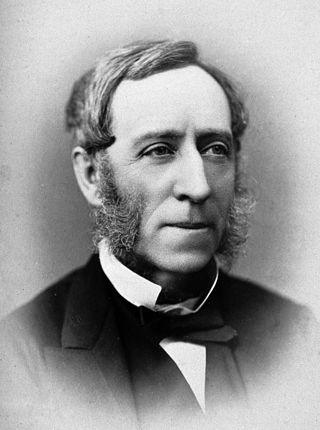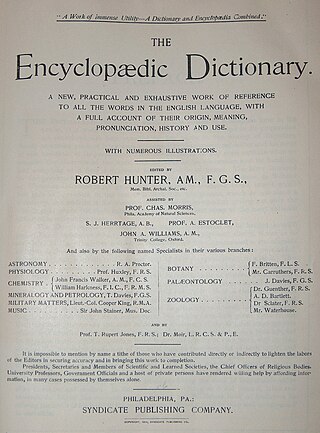Related Research Articles

Abracadabra is a magic word, historically used as an incantation on amulets and common today in stage magic.

An encyclopedia or encyclopædia is a reference work or compendium providing summaries of knowledge either general or special to a particular field or discipline. Encyclopedias are divided into articles or entries that are arranged alphabetically by article name or by thematic categories, or else are hyperlinked and searchable. Encyclopedia entries are longer and more detailed than those in most dictionaries. Generally speaking, encyclopedia articles focus on factual information concerning the subject named in the article's title; this is unlike dictionary entries, which focus on linguistic information about words, such as their etymology, meaning, pronunciation, use, and grammatical forms.
Hubris, or less frequently hybris, describes a personality quality of extreme or excessive pride or dangerous overconfidence, often in combination with arrogance. The term arrogance comes from the Latin adrogare, meaning "to feel that one has a right to demand certain attitudes and behaviors from other people". To arrogate means "to claim or seize without justification... To make undue claims to having", or "to claim or seize without right... to ascribe or attribute without reason". The term pretension is also associated with the term hubris, but is not synonymous with it.
Antistrophe is the portion of an ode sung by the chorus in its returning movement from west to east in response to the strophe, which was sung from east to west.
Apoplexy is rupture of an internal organ and the accompanying symptoms. The term formerly referred to what is now called a hemorrhagic stroke, which is the result of a ruptured blood vessel in the brain. Nowadays, health care professionals do not use the term, but instead specify the anatomic location of the bleeding, such as cerebral, ovarian or pituitary.

Bagatelle is a billiards-derived indoor table game, the object of which is to get a number of balls past wooden pins into holes that are guarded by wooden pegs; penalties are incurred if the pegs are knocked over. It probably developed from the table made with raised sides for trou madame, which was also played with ivory balls and continued to be popular into the later 19th century, after which it developed into bar billiards, with influences from the French/Belgian game billard russe. A bagatelle variant using fixed metal pins, billard japonais, eventually led to the development of pachinko and pinball.
An anecdote is "a story with a point", such as to communicate an abstract idea about a person, place, or thing through the concrete details of a short narrative or to characterize by delineating a specific quirk or trait. Occasionally humorous, anecdotes differ from jokes because their primary purpose is not simply to provoke laughter but to reveal a truth more general than the brief tale itself.

In classical architecture, an architrave is the lintel or beam that rests on the capitals of columns.

Sir Richard Quain, 1st Baronet, was an Irish physician.

Ephraim Chambers was an English writer and encyclopaedist, who is primarily known for producing the Cyclopaedia, or an Universal Dictionary of Arts and Sciences. Chambers' Cyclopædia is known as the original source material for the French Encyclopédie that started off as a translation of Cyclopædia.

Cyclopædia: or, An Universal Dictionary of Arts and Sciences is an encyclopedia prepared by Ephraim Chambers and first published in 1728; six more editions appeared between 1728 and 1751 with a Supplement in 1753. The Cyclopædia was one of the first general encyclopedias to be produced in English.
Catarrh is an exudate of inflamed mucous membranes in one of the airways or cavities of the body, usually with reference to the throat and paranasal sinuses. It can result in a thick exudate of mucus and white blood cells caused by the swelling of the mucous membranes in the head in response to an infection. It is a symptom usually associated with the common cold, pharyngitis, and chesty coughs, but it can also be found in patients with adenoiditis, otitis media, sinusitis or tonsillitis. The phlegm produced by catarrh may either discharge or cause a blockage that may become chronic.
Annals are a concise historical record in which events are arranged chronologically, year by year, although the term is also used loosely for any historical record.
In Attic drama, the coryphaeus, corypheus, or koryphaios was the leader of the chorus. Hence the term is used for the chief or leader of any company or movement. The coryphaeus spoke for all the rest, whenever the chorus took part in the action, in quality of a person of the drama, during the course of the acts.

Phenazone is an analgesic, antipyretic and anti-inflammatory drug. While it predates the term, it is often classified as a nonsteroidal anti-inflammatory drug (NSAID). Phenazone was one of the earliest synthetic medications — when it was patented in 1883, the only synthetic medical chemicals on the market were chloral hydrate, a sedative, trimethylamine, and iodol (tetraiodopyrrol), an early antiseptic. One of the earliest widely used analgesics and antipyretics, phenazone was gradually replaced in common use by other medications including phenacetin, aspirin, paracetamol and modern NSAIDs such as ibuprofen. However, it is still available in several countries either as an over-the-counter or prescribed drug.
An idiosyncrasy is an unusual feature of a person. It can also mean an odd habit. The term is often used to express eccentricity or peculiarity. A synonym may be "quirk".

An encyclopedic dictionary typically includes many short listings, arranged alphabetically, and discussing a wide range of topics. Encyclopedic dictionaries can be general, containing articles on topics in many different fields; or they can specialize in a particular field, such as art, biography, law, medicine, or philosophy. They may also be organized around a particular academic, cultural, ethnic, or national perspective.
Cess is a tax that is generally levied for promoting services like health and education. Governments often charge cess for the purpose of development in social sectors. The word is a shortened form of "assess". The spelling is due to a mistaken connection with census.

Anchuthengu, formerly known as Anjengo, Angengo or Anjenga, is a coastal panchayath and town in the Thiruvananthapuram District of Kerala. It is situated 9km south-west of Varkala Town along Trivandrum - Varkala - Kollam coastal highway.
References
- Chambers, Ephraim, ed. (1728), "Anodyne", Cyclopædia, James & John Knapton.
- Baynes, T. S., ed. (1878), , Encyclopædia Britannica , vol. 2 (9th ed.), New York: Charles Scribner's Sons, p. 90
- Chisholm, Hugh, ed. (1911), , Encyclopædia Britannica , vol. 2 (11th ed.), Cambridge University Press, p. 79
- Quain, Richard (1883), A Dictionary of Medicine: Including General Pathology, General Therapeutics